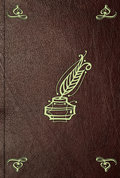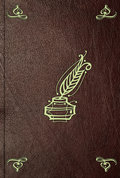
Вашингтон Ирвинг
Astoria; Or, Anecdotes of an Enterprise Beyond the Rocky Mountains
CHAPTER XXXVIII
The Village of Wish-ram. – Roguery of the Inhabitants. – Their Habitations. – Tidings of Astoria. – Of the Tonquin Massacre. – Thieves About the Camp. – A Band of Braggarts – Embarkation. – Arrival at Astoria. – A Joyful Reception. – Old Comrade. – Adventures of Reed, M’Lellan, and M’Kenzie Among the Snake River Mountains. – Rejoicing at Astoria.
OF the village of Wish-ram, the aborigines’ fishing mart of the Columbia, we have given some account in an early chapter of this work. The inhabitants held a traffic in the productions of the fisheries of the falls, and their village was the trading resort of the tribes from the coast and from the mountains. Mr. Hunt found the inhabitants shrewder and more intelligent than any Indians he had met with. Trade had sharpened their wits, though it had not improved their honesty; for they were a community of arrant rogues and freebooters. Their habitations comported with their circumstances, and were superior to any the travellers had yet seen west of the Rocky Mountains. In general, the dwellings of the savages on the Pacific side of that great barrier were mere tents and cabins of mats, or skins, or straw, the country being destitute of timber. In Wish-ram, on the contrary, the houses were built of wood, with long sloping roofs. The floor was sunk about six feet below the surface of the ground, with a low door at the gable end, extremely narrow, and partly sunk. Through this it was necessary to crawl and then to descend a short ladder. This inconvenient entrance was probably for the purpose of defense; there were loop-holes also under the eaves, apparently for the discharge of arrows. The houses were large, generally containing two or three families. Immediately within the door were sleeping places, ranged along the walls, like berths in a ship; and furnished with pallets of matting. These extended along one half of the building; the remaining half was appropriated to the storing of dried fish.
The trading operations of the inhabitants of Wish-ram had given them a wider scope of information, and rendered their village a kind of headquarters of intelligence. Mr. Hunt was able, therefore, to collect more distinct tidings concerning the settlement of Astoria and its affairs. One of the inhabitants had been at the trading post established by David Stuart on the Oakinagan, and had picked up a few words of English there. From him, Mr. Hunt gleaned various particulars about that establishment, as well as about the general concerns of the enterprise. Others repeated the name of Mr. M’Kay, the partner who perished in the massacre on board of the Tonquin, and gave some account of that melancholy affair. They said Mr. M’Kay was a chief among the white men, and had built a great house at the mouth of the river, but had left it and sailed away in a large ship to the northward where he had been attacked by bad Indians in canoes. Mr. Hunt was startled by this intelligence, and made further inquiries. They informed him that the Indians had lashed their canoes to the ship, and fought until they killed him and all his people. This is another instance of the clearness with which intelligence is transmitted from mouth to mouth among the Indian tribes. These tidings, though but partially credited by Mr. Hunt, filled his mind with anxious forebodings. He now endeavored to procure canoes, in which to descend the Columbia, but none suitable for the purpose were to be obtained above the Narrows; he continued on, therefore, the distance of twelve miles, and encamped on the bank of the river. The camp was soon surrounded by loitering savages, who went prowling about seeking what they might pilfer. Being baffled by the vigilance of the guard, they endeavored to compass their ends by other means. Towards evening, a number of warriors entered the camp in ruffling style; painted and dressed out as if for battle, and armed with lances, bows and arrows, and scalping knives. They informed Mr. Hunt that a party of thirty or forty braves were coming up from a village below to attack the camp and carry off the horses, but that they were determined to stay with him and defend him. Mr. Hunt received them with great coldness, and, when they had finished their story, gave them a pipe to smoke. He then called up all hands, stationed sentinels in different quarters, but told them to keep as vigilant an eye within the camp as without.
The warriors were evidently baffled by these precautions, and, having smoked their pipe, and vapored off their valor, took their departure. The farce, however, did not end here. After a little while the warriors returned, ushering in another savage, still more heroically arrayed. This they announced as the chief of the belligerent village, but as a great pacificator. His people had been furiously bent upon the attack, and would have doubtless carried it into effect, but this gallant chief had stood forth as the friend of white men, and had dispersed the throng by his own authority and prowess. Having vaunted this signal piece of service, there was a significant pause; all evidently expecting some adequate reward. Mr. Hunt again produced the pipe, smoked with the chieftain and his worthy compeers; but made no further demonstrations of gratitude. They remained about the camp all night, but at daylight returned, baffled and crestfallen, to their homes, with nothing but smoke for their pains.
Mr. Hunt now endeavored to procure canoes, of which he saw several about the neighborhood, extremely well made, with elevated stems and sterns, some of them capable of carrying three thousand pounds weight. He found it extremely difficult, however, to deal with these slippery people, who seemed much more inclined to pilfer. Notwithstanding a strict guard maintained round the camp, various implements were stolen, and several horses carried off. Among the latter, we have to include the long-cherished steed of Pierre Dorion. From some wilful caprice, that worthy pitched his tent at some distance from the main body, and tethered his invaluable steed beside it, from whence it was abstracted in the night, to the infinite chagrin and mortification of the hybrid interpreter.
Having, after several days’ negotiation, procured the requisite number of canoes, Mr. Hunt would gladly have left this thievish neighborhood, but was detained until the 5th of February by violent head winds, accompanied by snow and rain. Even after he was enabled to get under way, he had still to struggle against contrary winds and tempestuous weather. The current of the river, however, was in his favor; having made a portage at the grand rapid, the canoes met with no further obstruction, and, on the afternoon of the 15th of February, swept round an intervening cape, and came in sight of the infant settlement of Astoria. After eleven months wandering in the wilderness, a great part of the time over trackless wastes, where the sight of a savage wigwam was a rarity, we may imagine the delight of the poor weatherbeaten travellers, at beholding the embryo establishment, with its magazines, habitations, and picketed bulwarks, seated on a high point of land, dominating a beautiful little bay, in which was a trim-built shallop riding quietly at anchor. A shout of joy burst from each canoe at the long-wished-for sight. They urged their canoes across the bay, and pulled with eagerness for shore, where all hands poured down from the settlement to receive and welcome them. Among the first to greet them on their landing, were some of their old comrades and fellow-sufferers, who, under the conduct of Reed, M’Lellan, and M’Kenzie, had parted from them at the Caldron Linn. These had reached Astoria nearly a month previously, and, judging from their own narrow escape from starvation, had given up Mr. Hunt and his followers as lost. Their greeting was the more warm and cordial. As to the Canadian voyageurs, their mutual felicitations, as usual, were loud and vociferous, and it was almost ludicrous to behold these ancient “comrades” and “confreres,” hugging and kissing each other on the river bank.
When the first greetings were over, the different bands interchanged accounts of their several wanderings, after separating at Snake River; we shall briefly notice a few of the leading particulars. It will be recollected by the reader, that a small exploring detachment had proceeded down the river, under the conduct of Mr. John Reed, a clerk of the company; that another had set off under M’Lellan, and a third in a different direction, under M’Kenzie. After wandering for several days without meeting with Indians, or obtaining any supplies, they came together fortuitously among the Snake River mountains, some distance below that disastrous pass or strait which had received the appellation of the Devil’s Scuttle Hole.
When thus united, their party consisted of M’Kenzie, M’Lellan, Reed, and eight men, chiefly Canadians. Being all in the same predicament, without horses, provisions, or information of any kind, they all agreed that it would be worse than useless to return to Mr. Hunt and encumber him with so many starving men, and that their only course was to extricate themselves as soon as possible from this land of famine and misery and make the best of their way for the Columbia. They accordingly continued to follow the downward course of Snake River; clambering rocks and mountains, and defying all the difficulties and dangers of that rugged defile, which subsequently, when the snows had fallen, was found impassable by Messrs. Hunt and Crooks.
Though constantly near to the borders of the river, and for a great part of the time within sight of its current, one of their greatest sufferings was thirst. The river had worn its way in a deep channel through rocky mountains, destitute of brooks or springs. Its banks were so high and precipitous, that there was rarely any place where the travellers could get down to drink of its waters. Frequently they suffered for miles the torments of Tantalus; water continually within sight, yet fevered with the most parching thirst. Here and there they met with rainwater collected in the hollows of the rocks, but more than once they were reduced to the utmost extremity; and some of the men had recourse to the last expedient to avoid perishing.
Their sufferings from hunger were equally severe. They could meet with no game, and subsisted for a time on strips of beaver skin, broiled on the coals. These were doled out in scanty allowances, barely sufficient to keep up existence, and at length failed them altogether. Still they crept feebly on, scarce dragging one limb after another, until a severe snow-storm brought them to a pause. To struggle against it, in their exhausted condition, was impossible, so cowering under an impending rock at the foot of a steep mountain, they prepared themselves for that wretched fate which seemed inevitable.
At this critical juncture, when famine stared them in the face, M’Lellan casting up his eyes, beheld an ahsahta, or bighorn, sheltering itself under a shelving rock on the side of the hill above them. Being in a more active plight than any of his comrades, and an excellent marksman, he set off to get within shot of the animal. His companions watched his movements with breathless anxiety, for their lives depended upon his success. He made a cautious circuit; scrambled up the hill with the utmost silence, and at length arrived, unperceived, within a proper distance. Here leveling his rifle he took so sure an aim, that the bighorn fell dead on the spot; a fortunate circumstance, for, to pursue it, if merely wounded, would have been impossible in his emaciated state. The declivity of the hill enabled him to roll the carcass down to his companions, who were too feeble to climb the rocks. They fell to work to cut it up; yet exerted a remarkable self-denial for men in their starving condition, for they contented themselves for the present with a soup made from the bones, reserving the flesh for future repasts. This providential relief gave them strength to pursue their journey, but they were frequently reduced to almost equal straits, and it was only the smallness of their party, requiring a small supply of provisions, that enabled them to get through this desolate region with their lives.
At length, after twenty-one days of to 11 and suffering, they got through these mountains, and arrived at a tributary stream of that branch of the Columbia called Lewis River, of which Snake River forms the southern fork. In this neighborhood they met with wild horses, the first they had seen west of the Rocky Mountains. From hence they made their way to Lewis River, where they fell in with a friendly tribe of Indians, who freely administered to their necessities. On this river they procured two canoes, in which they dropped down the stream to its confluence with the Columbia, and then down that river to Astoria, where they arrived haggard and emaciated, and perfectly in rags.
Thus, all the leading persons of Mr. Hunt’s expedition were once more gathered together, excepting Mr. Crooks, of whose safety they entertained but little hope, considering the feeble condition in which they had been compelled to leave him in the heart of the wilderness.
A day was now given up to jubilee, to celebrate the arrival of Mr. Hunt and his companions, and the joyful meeting of the various scattered bands of adventurers at Astoria. The colors were hoisted; the guns, great and small, were fired; there was a feast of fish, of beaver, and venison, which relished well with men who had so long been glad to revel on horse flesh and dogs’ meat; a genial allowance of grog was issued, to increase the general animation, and the festivities wound up, as usual, with a grand dance at night, by the Canadian voyageurs.8
CHAPTER XXXIX
Scanty Fare During the Winter. – A Poor Hunting Ground. – The Return of the Fishing Season. – The Uthlecan or Smelt. – Its Qualities. – Vast Shoals of it. – Sturgeon. – Indian Modes of Taking It. – The Salmon – Different Species. – Nature of the Country About the Coast. – Forests and Forest Trees. – A Remarkable Flowering Vine. – Animals. – Birds. – Reptiles – Climate West of the Mountains – Mildness of the Temperature. – Soil of the Coast and the Interior.
THE winter passed away tranquilly at Astoria. The apprehensions of hostility from the natives had subsided; indeed, as the season advanced, the Indians for the most part had disappeared from the neighborhood, and abandoned the sea-coast, so that, for want of their aid, the colonists had at times suffered considerably for want of provisions. The hunters belonging to the establishment made frequent and wide excursions, but with very moderate success. There were some deer and a few bears to be found in the vicinity, and elk in great numbers; the country, however, was so rough, and the woods so close and entangled that it was almost impossible to beat up the game. The prevalent rains of winter, also, rendered it difficult for the hunter to keep his arms in order. The quantity of game, therefore, brought in by the hunters was extremely scanty, and it was frequently necessary to put all hands on very moderate allowance. Towards spring, however, the fishing season commenced – the season of plenty on the Columbia. About the beginning of February, a small kind of fish, about six inches long, called by the natives the uthlecan, and resembling the smelt, made its appearance at the mouth of the river. It is said to be of delicious flavor, and so fat as to burn like a candle, for which it is often used by the natives. It enters the river in immense shoals, like solid columns, often extending to the depth of five or more feet, and is scooped up by the natives with small nets at the end of poles. In this way they will soon fill a canoe, or form a great heap upon the river banks. These fish constitute a principal article of their food; the women drying them and stringing them on cords. As the uthlecan is only found in the lower part of the river, the arrival of it soon brought back the natives to the coast; who again resorted to the factory to trade, and from that time furnished plentiful supplies of fish.
The sturgeon makes its appearance in the river shortly after the uthlecan, and is taken in different ways by the natives: sometimes they spear it; but oftener they use the hook and line, and the net. Occasionally, they sink a cord in the river by a heavy weight, with a buoy at the upper end, to keep floating. To this cord several hooks are attached by short lines, a few feet distant from each other, and baited with small fish. This apparatus is often set towards night, and by the next morning several sturgeon will be found hooked by it; for though a large and strong fish, it makes but little resistance when ensnared.
The salmon, which are the prime fish of the Columbia, and as important to the piscatory tribes as are the buffaloes to the hunters of the prairies, do not enter the river until towards the latter part of May, from which time, until the middle of August, they abound and are taken in vast quantities, either with the spear or seine, and mostly in shallow water. An inferior species succeeds, and continues from August to December. It is remarkable for having a double row of teeth, half an inch long and extremely sharp, from whence it has received the name of the dog-toothed salmon. It is generally killed with the spear in small rivulets, and smoked for winter provision. We have noticed in a former chapter the mode in which the salmon are taken and cured at the falls of the Columbia; and put tip in parcels for exportation. From these different fisheries of the river tribes, the establishment at Astoria had to derive much of its precarious supplies of provisions.
A year’s residence at the mouth of the Columbia, and various expeditions in the interior, had now given the Astorians some idea of the country. The whole coast is described as remarkably rugged and mountainous; with dense forests of hemlock, spruce, white and red cedar, cotton-wood, white oak, white and swamp ash, willow, and a few walnut. There is likewise an undergrowth of aromatic shrubs, creepers, and clambering vines, that render the forests almost impenetrable; together with berries of various kinds, such as gooseberries, strawberries, raspberries, both red and yellow, very large and finely flavored whortleberries, cranberries, serviceberries, blackberries, currants, sloes, and wild and choke cherries.
Among the flowering vines is one deserving of particular notice. Each flower is composed of six leaves or petals, about three inches in length, of a beautiful crimson, the inside spotted with white. Its leaves, of a fine green, are oval, and disposed by threes. This plant climbs upon the trees without attaching itself to them; when it has reached the topmost branches, it descends perpendicularly, and as it continues to grow, extends from tree to tree, until its various stalks interlace the grove like the rigging of a ship. The stems or trunks of this vine are tougher and more flexible than willow, and are from fifty to one hundred fathoms in length. From the fibres, the Indians manufacture baskets of such close texture as to hold water.
The principal quadrupeds that had been seen by the colonists in their various expeditions were the stag, fallow deer, hart, black and grizzly bear, antelope, ahsahta or bighorn, beaver, sea and river otter, muskrat, fox, wolf, and panther, the latter extremely rare. The only domestic animals among the natives were horses and dogs.
The country abounded with aquatic and land birds, such as swans, wild geese, brant, ducks of almost every description, pelicans, herons, gulls, snipes, curlews, eagles, vultures, crows, ravens, magpies, woodpeckers, pigeons, partridges, pheasants, grouse, and a great variety of singing birds.
There were few reptiles; the only dangerous kinds were the rattlesnake, and one striped with black, yellow, and white, about four feet long. Among the lizard kind was one about nine or ten inches in length, exclusive of the tall, and three inches in circumference. The tail was round, and of the same length as the body. The head was triangular, covered with small square scales. The upper part of the body was likewise covered with small scales, green, yellow, black, and blue. Each foot had five toes, furnished with strong nails, probably to aid it in burrowing, as it usually lived under ground on the plains.
A remarkable fact, characteristic of the country west of the Rocky Mountains, is the mildness and equability of the climate. The great mountain barrier seems to divide the continent into different climates, even in the same degrees of latitude. The rigorous winters and sultry summers, and all the capricious inequalities of temperature prevalent on the Atlantic side of the mountains, are but little felt on their western declivities. The countries between them and the Pacific are blessed with milder and steadier temperature, resembling the climates of parallel latitudes in Europe. In the plains and valleys but little snow falls throughout the winter, and usually melts while falling. It rarely lies on the ground more than two days at a time, except on the summits of the mountains. The winters are rainy rather than cold. The rains for five months, from the middle of October to the middle of March, are almost incessant, and often accompanied by tremendous thunder and lightning. The winds prevalent at this season are from the south and southeast, which usually bring rain. Those from the north to the southwest are the harbingers of fair weather and a clear sky. The residue of the year, from the middle of March to the middle of October, an interval of seven months, is serene and delightful. There is scarcely any rain throughout this time, yet the face of the country is kept fresh and verdant by nightly dews, and occasionally by humid fogs in the mornings. These are not considered prejudicial to health, since both the natives and the whites sleep in the open air with perfect impunity. While this equable and bland temperature prevails throughout the lower country, the peaks and ridges of the vast mountains by which it is dominated, are covered with perpetual snow. This renders them discernible at a great distance, shining at times like bright summer clouds, at other times assuming the most aerial tints, and always forming brilliant and striking features in the vast landscape. The mild temperature prevalent throughout the country is attributed by some to the succession of winds from the Pacific Ocean, extending from latitude twenty degrees to at least fifty degrees north. These temper the heat of summer, so that in the shade no one is incommoded by perspiration; they also soften the rigors of winter, and produce such a moderation in the climate, that the inhabitants can wear the same dress throughout the year.
The soil in the neighborhood of the sea-coast is of a brown color, inclining to red, and generally poor; being a mixture of clay and gravel. In the interior, and especially in the valleys of the Rocky Mountains, the soil is generally blackish, though sometimes yellow. It is frequently mixed with marl, and with marine substances in a state of decomposition. This kind of soil extends to a considerable depth, as may be perceived in the deep cuts made by ravines, and by the beds of rivers. The vegetation in these valleys is much more abundant than near the coast; in fact, it is these fertile intervals, locked up between rocky sierras, or scooped out from barren wastes, that population must extend itself, as it were, in veins and ramifications, if ever the regions beyond the mountains should become civilized.







